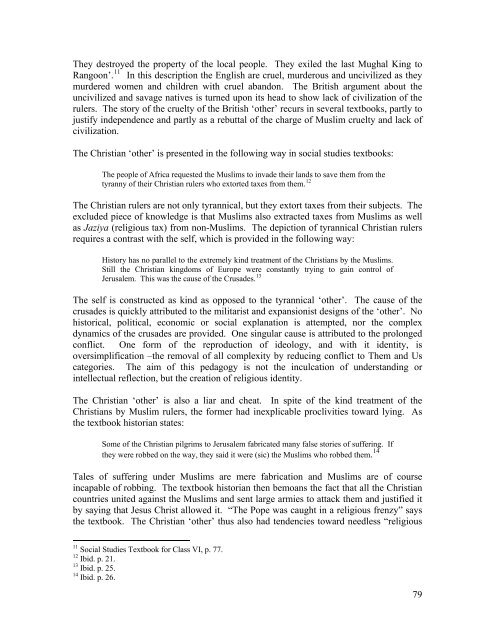Living on the Margins. Minorities in South Asia - EURAC
Living on the Margins. Minorities in South Asia - EURAC
Living on the Margins. Minorities in South Asia - EURAC
- TAGS
- minorities
- eurac
- www.eurac.edu
Create successful ePaper yourself
Turn your PDF publications into a flip-book with our unique Google optimized e-Paper software.
They destroyed <strong>the</strong> property of <strong>the</strong> local people. They exiled <strong>the</strong> last Mughal K<strong>in</strong>g to<br />
Rango<strong>on</strong>’. 11 In this descripti<strong>on</strong> <strong>the</strong> English are cruel, murderous and uncivilized as <strong>the</strong>y<br />
murdered women and children with cruel aband<strong>on</strong>. The British argument about <strong>the</strong><br />
uncivilized and savage natives is turned up<strong>on</strong> its head to show lack of civilizati<strong>on</strong> of <strong>the</strong><br />
rulers. The story of <strong>the</strong> cruelty of <strong>the</strong> British ‘o<strong>the</strong>r’ recurs <strong>in</strong> several textbooks, partly to<br />
justify <strong>in</strong>dependence and partly as a rebuttal of <strong>the</strong> charge of Muslim cruelty and lack of<br />
civilizati<strong>on</strong>.<br />
The Christian ‘o<strong>the</strong>r’ is presented <strong>in</strong> <strong>the</strong> follow<strong>in</strong>g way <strong>in</strong> social studies textbooks:<br />
The people of Africa requested <strong>the</strong> Muslims to <strong>in</strong>vade <strong>the</strong>ir lands to save <strong>the</strong>m from <strong>the</strong><br />
tyranny of <strong>the</strong>ir Christian rulers who extorted taxes from <strong>the</strong>m. 12<br />
The Christian rulers are not <strong>on</strong>ly tyrannical, but <strong>the</strong>y extort taxes from <strong>the</strong>ir subjects. The<br />
excluded piece of knowledge is that Muslims also extracted taxes from Muslims as well<br />
as Jaziya (religious tax) from n<strong>on</strong>-Muslims. The depicti<strong>on</strong> of tyrannical Christian rulers<br />
requires a c<strong>on</strong>trast with <strong>the</strong> self, which is provided <strong>in</strong> <strong>the</strong> follow<strong>in</strong>g way:<br />
History has no parallel to <strong>the</strong> extremely k<strong>in</strong>d treatment of <strong>the</strong> Christians by <strong>the</strong> Muslims.<br />
Still <strong>the</strong> Christian k<strong>in</strong>gdoms of Europe were c<strong>on</strong>stantly try<strong>in</strong>g to ga<strong>in</strong> c<strong>on</strong>trol of<br />
Jerusalem. This was <strong>the</strong> cause of <strong>the</strong> Crusades. 13<br />
The self is c<strong>on</strong>structed as k<strong>in</strong>d as opposed to <strong>the</strong> tyrannical ‘o<strong>the</strong>r’. The cause of <strong>the</strong><br />
crusades is quickly attributed to <strong>the</strong> militarist and expansi<strong>on</strong>ist designs of <strong>the</strong> ‘o<strong>the</strong>r’. No<br />
historical, political, ec<strong>on</strong>omic or social explanati<strong>on</strong> is attempted, nor <strong>the</strong> complex<br />
dynamics of <strong>the</strong> crusades are provided. One s<strong>in</strong>gular cause is attributed to <strong>the</strong> prol<strong>on</strong>ged<br />
c<strong>on</strong>flict. One form of <strong>the</strong> reproducti<strong>on</strong> of ideology, and with it identity, is<br />
oversimplificati<strong>on</strong> –<strong>the</strong> removal of all complexity by reduc<strong>in</strong>g c<strong>on</strong>flict to Them and Us<br />
categories. The aim of this pedagogy is not <strong>the</strong> <strong>in</strong>culcati<strong>on</strong> of understand<strong>in</strong>g or<br />
<strong>in</strong>tellectual reflecti<strong>on</strong>, but <strong>the</strong> creati<strong>on</strong> of religious identity.<br />
The Christian ‘o<strong>the</strong>r’ is also a liar and cheat. In spite of <strong>the</strong> k<strong>in</strong>d treatment of <strong>the</strong><br />
Christians by Muslim rulers, <strong>the</strong> former had <strong>in</strong>explicable proclivities toward ly<strong>in</strong>g. As<br />
<strong>the</strong> textbook historian states:<br />
Some of <strong>the</strong> Christian pilgrims to Jerusalem fabricated many false stories of suffer<strong>in</strong>g. If<br />
<strong>the</strong>y were robbed <strong>on</strong> <strong>the</strong> way, <strong>the</strong>y said it were (sic) <strong>the</strong> Muslims who robbed <strong>the</strong>m. 14<br />
Tales of suffer<strong>in</strong>g under Muslims are mere fabricati<strong>on</strong> and Muslims are of course<br />
<strong>in</strong>capable of robb<strong>in</strong>g. The textbook historian <strong>the</strong>n bemoans <strong>the</strong> fact that all <strong>the</strong> Christian<br />
countries united aga<strong>in</strong>st <strong>the</strong> Muslims and sent large armies to attack <strong>the</strong>m and justified it<br />
by say<strong>in</strong>g that Jesus Christ allowed it. “The Pope was caught <strong>in</strong> a religious frenzy” says<br />
<strong>the</strong> textbook. The Christian ‘o<strong>the</strong>r’ thus also had tendencies toward needless “religious<br />
11<br />
Social Studies Textbook for Class VI, p. 77.<br />
12<br />
Ibid. p. 21.<br />
13<br />
Ibid. p. 25.<br />
14<br />
Ibid. p. 26.<br />
79

















